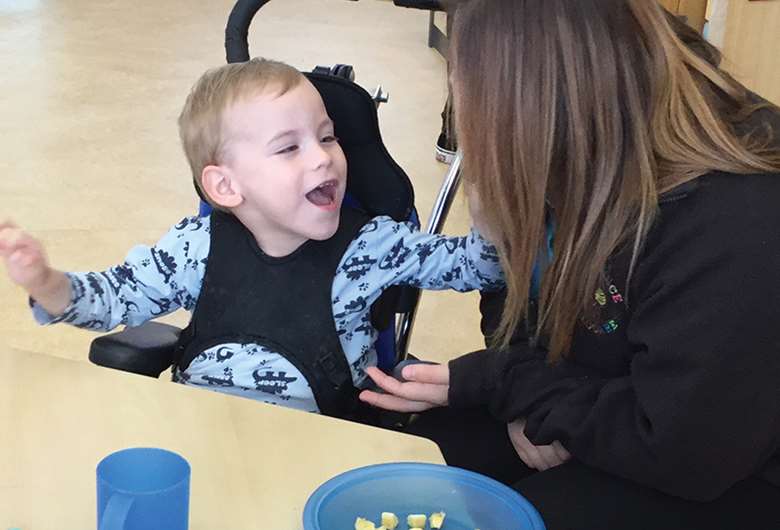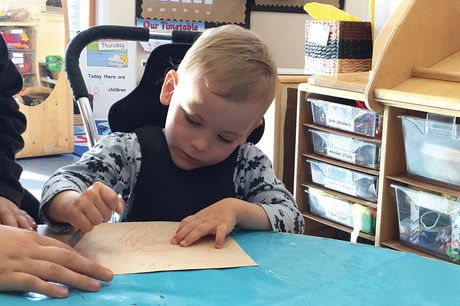A Unique Child: Inclusion - Supporting… Alfie
Hannah McCormack
Monday, October 31, 2016
How one mainstream setting has adapted to care for a boy with cerebral palsy, with rewarding results for all parties. By Hannah McCormack

Alfie is a friendly, confident, outgoing three-year-old with an amazing smile and sense of humour. He has been attending Trenance Childcare, part of Newquay Children’s Centre, for just over a year, and recently made the transition into our pre-school room. It’s a daunting move for many three-year-olds, and for Alfie, it was an even bigger step.
Medically, Alfie is described as ‘having complex needs’, a broad term often used to identify children with two or more severe and/or longstanding needs. In Alfie’s case, he has spastic quadriplegia cerebral palsy, which has resulted in visual impairment, feeding difficulties and seizures, both tonic-clonic and absence.
Tonic-clonic seizures are characterised by a stiffening of the muscles and loss of consciousness followed by rapid jerky movements and a period of drowsiness or agitation. Nevertheless, despite Alfie’s complex needs, he is flourishing in our pre-school room, participating in activities and engaging in routines alongside his peers.
INCLUSIVE PRACTICE
We are a mainstream setting and have not been supporting children with complex needs for very long. Before Alfie started, it was daunting trying to consider how we were going to support and meet all of his needs.
On paper, there was a long list of medical conditions, treatment plans, specialist equipment and a significant number of other professionals involved in his care. However, the moment Alfie entered the setting, that long list became an ‘actual child’.
We had got caught up in Alfie’s medical needs and forgotten that underneath all of it was a beautiful little boy who was ready to play and meet lots of new friends. At this point, we realised that rather than trying to identify and address every possible need from the outset, what mattered was meeting Alfie’s immediate needs and having the resolve to overcome any future problem, regardless of how great the barrier or challenge.
CHALLENGES
Supporting children with complex needs is not without challenge. One of the biggest challenges when caring for Alfie is ensuring an effective multi-agency approach to his care. At any one point, Alfie can have ten or more professionals working with him, so establishing and maintaining good lines of communication has been crucial. It means we can:
- all work together to share common goals and latest updates, reviews and recommendations, which often inform Alfie’s care plans within the setting
- schedule professional appointments at times that have the least impact and interruption on Alfie’s time with us, as he attends the nursery for only a day and a half a week
- avoid double-booking professional visits. Some professionals, such as Alfie’s occupational therapists and physiotherapists, regularly come into the setting to work withhim, while others make only occasional visits.
Another significant challenge in caring for Alfie is the changeability of his health needs. Alfie is susceptible to infections, and when he is unwell, it can have a significant impact on the amount of involuntary movements he makes and the fluency of his speech. We have also noticed he will have an increased amount of tonic-clonic and absence seizures.
At times, he will show subtle signs he is unwell, so it is vital we recognise these and monitor him closely as he can become very poorly, very quickly.
Alfie can be unwell for several weeks but not severely enough to keep him at home. During these times we adopt a ‘burst-pause’ approach to his learning, whereby we support Alfie in an activity and then provide him with a longer period of rest before the next activity. We like to provide Alfie with a stimulating and challenging learning environment, but equally we need to recognise when his health needs must take priority.
It is vital, then, that as practitioners we are intuitive, responsive and sensitive to Alfie’s changing needs and adapt practice when required. Although Alfie’s cerebral palsy diagnosis is ‘fixed’, his symptoms and co-occurring conditions vary significantly.
For example, Alfie experiences ongoing feeding difficulties, particularly when he is unwell, and in response to this he is due to have a gastrostomy feeding tube fitted next month. This tube will enable Alfie to receive his medication more effectively and continue to provide much-needed nutrition when he is unable to eat.

TRAINING
We will undergo further training to learn how to use and care for Alfie’s gastrostomy tube when he is in the setting. Ongoing training is vital in supporting Alfie as he does have a high level of medical care needs. As an early years team, most of our training is in childcare and early education, and while all our practitioners are first-aid trained, our medical knowledge is limited.
The key people who work with Alfie have received further training specific to his needs. For example, some of the team have attended additional epilepsy awareness training. Although Alfie does not yet have an official diagnosis of epilepsy, he does experience varying types of seizures which at times can be very subtle. The training provided us with a more in-depth understanding of his condition and how to manage, monitor and respond effectively to it.
Similarly, we regularly undertake mandatory manual handling training, though this does not include children with complex needs and Alfie relies on adults to support his transitions to and from several pieces of specialist equipment. Finding training that was more specific to his needs was a challenge, as there was none readily available for early years practitioners. Eventually, a social care team found a provider who was prepared to deliver training to us.
BENEFITS
Although supporting children with complex needs within a mainstream setting can be difficult, the benefits to the child, their family and other practitioners outweigh any challenges.
Over the past year, Alfie has come on leaps and bounds in his development and has even surpassed many of the educational goals set out in his Education, Health and Care (EHC) plan. Alfie was predominantly non-verbal when he began; now he is communicating effectively with both adults and his peers and he is able to express his needs, wants and interests.
For Alfie’s parents, the biggest benefit has been an increase in their aspirations for him. They assumed that due to the complexity of his needs, specialist settings were the only option available to him. However, when we highlighted that we were very much an option, his mum was delighted that he could follow his siblings through our setting.
Although our local offer highlights that we are a fully accessible setting, I do not think parents are fully aware that many mainstream settings, and schools, can provide care for children with complex needs. Alfie’s parents hope that he will continue into mainstream education when he enters primary school next year.
Practitioners have also gained enormously from supporting Alfie. Our confidence as a setting has grown in terms of caring for children with complex needs. Each day we are learning about what works well, and less well. When plans don’t work out, we view it as an opportunity to develop practice, rather than a failure.
Alfie has made us realise an inclusive pedagogy is not about getting it ‘right’ or ‘wrong’ but about striving to ensure equality of access and opportunity for all children and not being afraid to try new approaches.
What we choose to do (or indeed not do) can have a significant impact on Alfie’s future learning and development. Therefore, it is paramount to reflect thoughtfully on practice and our own personal views to ensure a continued responsiveness to diversity and difference within a classroom.
Through developing practice and creating an inclusive pedagogy throughout a setting, particularly within a mainstream setting, we can ensure the best possible practice and support for all children and families.
CEREBRAL PALSY: KEY FACTS
Cerebral palsy is a term given to a range of neurological conditions that affect movement, muscle control and co-ordination.
The predominate causes of cerebral palsy are brain injury or malformation of a developing brain before, during or after birth.
One in 400 children born in the UK is diagnosed with cerebral palsy – giving an annual total of 1,800 children.
Each individual with cerebral palsy can be impaired to varying degrees of severity and the condition is often associated with other conditions such as learning difficulties, epilepsy, sensory impairments (hearing and sight), communication and feeding difficulties.
Cerebral palsy is a life-long condition which is not curable. However, it is a non-progressive condition and there are many therapeutic and medical treatments available to reduce the effect of the symptoms.
MORE INFORMATION
The charity Scope provides a range of resources, information, guidance and support for early years practitioners and settings: www.scope.org.uk/support/professionals/preschool-teachers
CerebralPalsy.org.uk provides further general information and advice
Hannah McCormack is an Early Years Teacher and SENCO. She is currently doing a Master’s degree in inclusive education at the University of St Mark & St John, Plymouth




